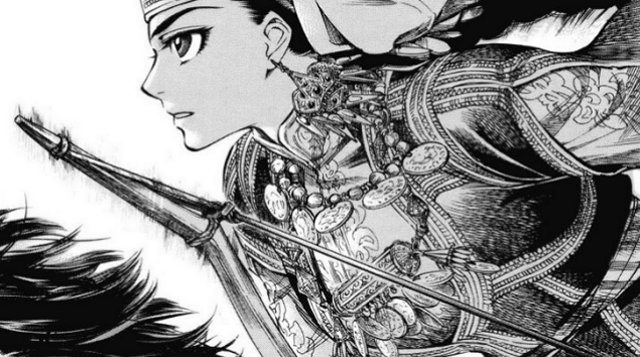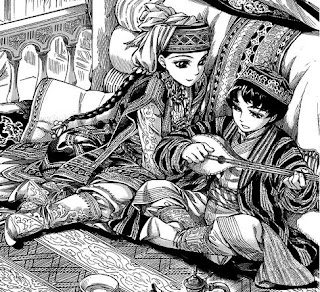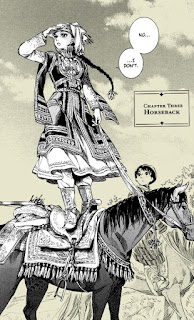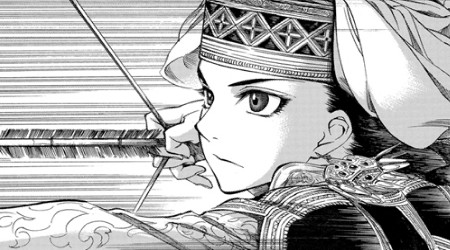How do you reconcile Western cultural expectations with the desire to see non-Western cultures depicted without white-washing or condescending changes made to local customs? How do you deal with a story and a character who makes total sense in her context but feels weird and kind of unsettling in yours? In other words, what do you do when you have a strong female character who feels just a teensy bit...repressed?
These are the questions I've been dealing with since I finally finished reading the first six volumes of A Bride's Story, which is an exhaustively researched and really very fun manga about life and culture in Central Asia a couple of hundred years ago - roughly the 1800s, I think. The manga, which is both written and illustrated by Kaoru Mori, follows the lives of a couple of different families in a region of Central Asia near the Caspian Sea. It's a historical romance and drama, but contrary to a lot of stories like that, this one is focussed squarely on the lives of the women of the area. It's especially focussed on marriage and wedding traditions, which is cool and frankly a little refreshing. Mostly, that is.
Our heroine in the story is Amir, the titular bride. The story starts when Amir, who is twenty, arrives in the village to meet her husband - it's an arranged marriage, as is traditional for the time and place - only to discover that her groom, Karluk, is eight years younger than her. Yup. This story is about a twenty year old woman who has to marry a twelve year old and then defer to him because they have a traditional society which puts him as the man of the household. It's awkward for everyone involved.
Amir handles this revelation with grace and dignity, but it's clear that this is a strange situation to be in. Most marriages of that time feature brides that are slightly younger than the grooms, because it takes the groom time to establish himself in the family and be monetarily settled. Amir and Karluk's marriage has come about for a couple of reasons then. First, because this is a culture of ultimogeniture, which means that the youngest son inherits, Karluk is the "most important" son. And second because the Halgal family, Amir's family, wants to make an alliance with the wealthy Eihon family. At least, at first they do.
If this all sounds kind of complex and dry to you, trust me that it actually works really well in the story. Like I said, this is a manga about women and women's culture of the time, and, well, that mostly revolves around marriages and homekeeping. We're generally socialized to think of that as a dull story, but it's not. It's rich and well-researched and very interesting. To me, anyway.
And this is not to say that there's no external plot to follow. As we get deeper into the story, a couple of plotlines start forming. There's the development of Amir and Karluk's marriage, obviously, where Amir is more of a big sister to Karluk but Karluk feels a need to assert himself because he is the head of the household technically. Then there's Amir's family, the Halgal clan, which is greedy and pretty ruthless and decides very quickly that they regret sending Amir off to marry Karluk and want to annul the marriage so she can be sent off to marry into some other rich family.
This plot is the most intense one, actually, because it features long insights into the fate of Amir's family and how the changing political structure of Turkic Central Asia at the time, as well as incursions by a colonizing Russian force, is clamping down on nomadic herding tribes. Also there are gigantic bloody battles and Amir is torn between her loyalty to her brother and her love for her husband and new family. So that's always interesting.
 Some of the plots also take us to different parts of Central Asia, courtesy of our eyes into the story, an English anthropologist named Henry Smith. At the start of the story he's living with the Eihon family as a treasured guest (and sort of a local curiosity), but he eventually sets out on his own, stumbling into a bunch of different cultures along the way. What's cool here is that the writer chooses not to make Henry Smith the focal point of any of these stories, but instead uses him as a tool to examine how women live in each of these situations. Like, how does a widow without any other family survive in such a patriarchal system? How do sisters deal with the prospect of being married off to different people and then having to go live with their husbands and never see each other again?
Some of the plots also take us to different parts of Central Asia, courtesy of our eyes into the story, an English anthropologist named Henry Smith. At the start of the story he's living with the Eihon family as a treasured guest (and sort of a local curiosity), but he eventually sets out on his own, stumbling into a bunch of different cultures along the way. What's cool here is that the writer chooses not to make Henry Smith the focal point of any of these stories, but instead uses him as a tool to examine how women live in each of these situations. Like, how does a widow without any other family survive in such a patriarchal system? How do sisters deal with the prospect of being married off to different people and then having to go live with their husbands and never see each other again?These are real and interesting questions that the narrative goes into, and I appreciate that. But I want to talk a bit more about Amir because she kind of fascinates me and frustrates me in equal measure.
I find her fascinating because Amir is actually really kickass. Because she comes from a nomadic tribe, she has a lot of practical skills that the Eihon family finds exotic. Like, she's an accomplished horsewoman and can even stand up while riding, which is super cool. She's a great archer and hunter, even managed to kill her own food when she and Karluk are out camping.
She's a scout and a tracker, she can butcher her own meat, and all kinds of super interesting skills. She's very matter of fact about life but not particularly cynical or beaten down by the world. She's friendly and kind, but also a little bit oblivious, which makes her more compelling. She's terrified of illness, which makes sense given the time period, and she's not great at sewing or at baking bread.
Amir is interesting. She's a view into a culture that we typically think of as homogenous and monolithic, but her interactions with the Eihon family show us that in all actuality, the culture has more diversity than our own. So all of that is super cool and interesting. What's the catch?
The catch is that Amir never quite crosses over into feeling like a person. At least, she doesn't to me. Other female characters, like Seleke or Pariya (who I love) or the twins do feel like comprehensive portraits of real women, but Amir doesn't. She feels just a little bit sanitized, a little bit airbrushed. And I think a lot of that has to do with her general attitude towards the plot point that was the biggest hurdle for me getting into this story: her marriage.
See, obviously for me there's a little bit of an ick factor involved in a woman marrying a boy. It's weird and it makes me uncomfortable. That is, I feel, entirely reasonable. But at the same time, I do understand that this is a historical thing that did happen. I get that, and it feels stupid to not want to consume a story just because it includes historical details that make me squirm. The problem I have, then, is really with how Amir deals with the situation: she's totally cool with it.
I mean, maybe not totally cool with it, but from all we can tell, Amir is perfectly happy in her life. She likes Karluk well enough, she likes the Eihon family, and by the second volume or so, she's so emotionally invested in them and her marriage that she refuses to go back to her family. And none of it is technically bad, but it feels disingenuous that Amir, who is a beautiful adult woman, is absolutely totally okay with being married to a kid who hasn't gone through puberty yet. And being told she has to listen to him as her chief authority in life. It's weird.
It's confusing for me because I can't imagine her not resenting Karluk. Maybe that's just me projecting onto this character (it almost certainly is), but it's a strange situation to imagine that Amir takes so easily to this bizarre power dynamic and relationship. Especially once Karluk starts puberty. But through it all, Amir is totally fine with everything that's happening (obviously up to this point in the books they haven't had sex, thank goodness, but it's still weird). Karluk occasionally feels strange about the difference, but Amir never does.
It all just feels too easy. That's the problem I have with it. It presents this view of women's culture in a male-dominated society, but it offers no commentary on how the women feel about their position. I'm not saying that the next volume ought to have Amir protesting in the streets of the village or being horrible to Karluk or anything, but I do think it would be more realistic if there were some tension. Some tension anywhere. Because that can't be an easy thing to live with. And I can't imagine that every woman is comfortable with how this society is run. There are always malcontents. Show me some of them.
Perhaps it's not so much that Amir is complacent and content in her life, but more that no one ever suggests to her that she is allowed not to be. That Amir, who is strong and courageous and incredibly competent, is allowed to think that she might be happier if she were allowed by her culture to ride freely on horseback and hunt and explore rather than sit at home and do embroidery.
Embroidery and baking bread aren't bad things, by the way. I don't mean to imply that. I personally sometimes laugh over how well I would fit in a traditional culture considering that my chief hobbies are needlework and cooking and how I used to make a living taking care of children. There's nothing wrong with enjoying domestic work and A Bride's Story does do an excellent job at showing the intricacies and value in such labors. The problem is that it is never even suggested that Amir could desire something else, something more.
As you can clearly tell, I have mixed feelings about Amir and A Bride's Story, but on the whole I think I like it. I think. I don't know... I want to support a story that goes into the realities of the lives of women in Central Asia, because I find that women's history and culture are largely overlooked and because Central Asia doesn't get nearly the attention it deserves. There's a lot of rich and fascinating culture there and I would love to learn more about it. So in that sense, I'm indebted to these books for teaching me so much about the people and events of this time and place I've always wondered about.
On the other hand, I find it troubling that Amir is so unevenly characterized. She never comes together as a character in the story because she's never really given a voice. She just seems to blithely accept the things that happen to her, and that makes for a difficult hero to love.
I guess, like some of my other articles for Strong Female Character Friday, this article is more of an expression of what I wish were the case than a celebration of a story that really does female characters well. I want Amir to be a strong female character, but I'm not sure if she is. For what it's worth, though, she could be, if only she were allowed a voice.




